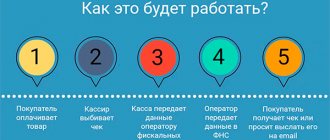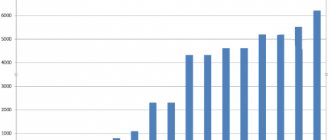From January 1, 2021, the VAT rate of 20% applies to goods (work, services), property rights, shipped (performed, rendered), transferred (clause 4 of article 5 of the Federal Law of 03.08.2018 No. 303-FZ “On Amendments to certain legislative acts of the Russian Federation on taxes and fees" (Law No. 303-FZ). Transactions subject to VAT at a rate of 18% are subject to VAT at a rate of 20% from the specified date.
The Russian Ministry of Finance issued a number of letters explaining that for calculating VAT at a rate of 20%, the date of conclusion of contracts does not matter (Letters of the Russian Ministry of Finance dated 08/06/2018 No. 03-07-05/55290, dated 09/07/2018 No. 03-07- 11/64045, dated 08/01/2018 No. 03-07-11/53970, dated 09/07/2018 No. 03-07-11/64049).
Even if contracts were signed in 2021 or earlier and full or partial prepayment was received for them or the sale of goods (provision of services) began, from January 1, 2021, a VAT rate of 20% is also applied to such contracts.
The determining condition for applying a rate of 18% or 20% is the date of shipment of the goods (provision of services, performance of work).
New VAT agents
Among the changes in VAT from 2021, one can highlight the assignment of agent status for this tax in some new cases in which such requirements were not previously provided. Thus, according to the new paragraph 8 of Article 161 of the Tax Code, the duties of a tax agent will have to be performed by companies and individual entrepreneurs that purchase non-ferrous metal waste, scrap, secondary aluminum and its alloys, as well as raw animal skins on the territory of the Russian Federation.
As under previously existing rules, tax agents in the described situation will have to calculate and pay the appropriate amount of VAT to the budget, regardless of whether they are a VAT payer or not according to the applicable taxation system. But on the OSN it is still possible not to transfer the amount of tax or, at a minimum, to reduce it - if, at the same time as the agency VAT payable, the company or individual entrepreneur declares its right to deduction.
Along with the expansion of the list of tax agents for VAT, fresh changes in 2021 also clarify situations in which the status of a tax agent does not arise. This applies to subjects of the all-Russian payment system, as well as telecom operators specified in Law No. 161-FZ of June 27, 2011.
From July 1, the Mercury system will be introduced for goods of animal origin.
From July 1, 2021, organizations and individual entrepreneurs are required to record the turnover and transportation of goods of animal origin in a new system from Rosselkhoznadzor called “Mercury”. It creates and records electronic veterinary accompanying documents (VSD) for meat, sausage and other regulated goods. Without access to the Mercury system, from July 1, these goods cannot be delivered or purchased.
Also see:
- “Mercury system: who is obliged to connect to it”;
- “Who will be freed from connection to the Mercury system.”
Zero VAT rate for re-export
Among the amendments to Chapter 21 of the Tax Code, there is an innovation regarding a change in the VAT rate in 2021 to zero for goods exported as part of re-export. A zero rate will be applied if the goods must undergo certain customs procedures, namely processing in the customs territory, free customs zone and free warehouse. The zero rate must be confirmed by documents provided for in Article 165 of the Code: an original or a copy of a foreign trade contract, a customs declaration, as well as copies of transport and shipping certificates.
Excise taxes
Administration of excise taxes.
In order to improve the conditions for stimulating entrepreneurial activity, from January 1, 2021, the payment of an annual license fee
for the right to engage in certain types of activities for the storage, wholesale and retail sale of alcoholic products
has been translated into fees for the use of licenses
to engage in certain types of activities.
Previously, the fee was paid in a lump sum until July 20, now the fee will be paid in equal installments no later than March 25, June 25, September 25 and December 25
current year. At the same time, I remind you that the fee for entrepreneurs in the capital is set at 200 MCI for wholesale trade and 100 MCI for retail trade (KBK 105434)
Starting from 2021, it is planned to establish new minimum retail prices for alcohol and tobacco products. A decree of the Government of the Republic of Kazakhstan will fix the minimum retail price for 2021 for vodka, strong alcoholic beverages (with a volume fraction of ethyl alcohol over 30%) and other strong alcoholic drinks within 2000 tenge per liter. For reference: In 2021, the minimum retail price was 1,700 tenge per liter.
The minimum retail prices for 20 (twenty) filter cigarettes from January 1, 2021 are planned to be set at 360 tenge.
For reference: Until 2021, the minimum price was 300 tenge. Sources: and
More about zero rates
An additional change in the payment of VAT from 2021 at a zero rate is the possibility of not officially applying the export exemption. The opportunity to refuse the 0% VAT rate applies to the export of goods or their transportation.
A waiver of the zero rate is possible for all export transactions as a whole, provided that an application is submitted to the Federal Tax Service no later than the 1st day of the quarter from which the taxpayer plans to pay VAT at the regular rate. The total period of refusal is no less than a year.
The meaning of such a waiver of the zero rate comes down to the possibility of deducting VAT billed at rates of 18% or 10% by those suppliers who, having the right to a zero rate, do not want to confirm it, as a result highlighting the regular tax in invoices. This situation can be seen quite often in relationships with Russian international carrier companies. Their services are subject to VAT at a zero rate, but this requires confirmation. Until now, if the invoice of such a company indicated VAT of 18% instead of zero VAT, controllers recognized this rate as incorrect (letter of the Federal Tax Service of Russia dated July 7, 2021 No. SA-4-7 / [email protected] ), and with The judges were in agreement with them (decision of the Supreme Court of the Russian Federation dated January 26, 2021 No. 304-KG15-18260). Accordingly, it was unlawful to deduct VAT on such a document. But the described amendment to Chapter 21, which provides changes in the payment of VAT in 2018 at a zero rate, as well as the possibility of abandoning it, should eliminate this problem.
From July 1, public sector employees were transferred to Mir cards
From July 1, banks are required to use only national payment card details when transferring payments:
- salary, maintenance and remuneration for civil servants;
- salaries of personnel of government agencies and municipal authorities, institutions, state funds;
- government scholarships.
Also see “Salaries of public sector employees are transferred to the MIR payment system.”
Zero VAT for postal items abroad
An important amendment regarding the possibility of applying a zero rate for postal items abroad will be relevant primarily for online stores that sell their goods to foreign buyers. The fact is that such sellers have the right to a zero VAT rate, but are also required to confirm it. The current version of the Tax Code does not contain a clear list of documents that the seller must collect in this situation. As a result, most VAT payers still pay tax on such transactions at the standard 18 percent rate. Changes to VAT from 2021 are designed to resolve this issue.
It will be possible to confirm the zero rate for postal items using the established list of documents: payment slips, a declaration in the CN 23 form or a customs declaration (new subparagraph 7, paragraph 1, article 165 of the Tax Code of the Russian Federation).
From July 1, many are required to switch to online cash registers
From July 1, more companies and entrepreneurs are required to use online cash register systems (Law dated July 3, 2016 No. 290-FZ).
You need to switch to CCP if, for example, you:
- accept payments from individuals through client-bank, Internet banking, mobile banking;
- you sell retail or provide catering services, being an organization on UTII;
- you sell goods through vending machines and you have employees;
- hired workers and provide catering services.
Also see “Who is required to switch to online cash registers: table.”
The new five percent rule
Currently, paragraph 4 of Article 170 of the Tax Code requires separate accounting of input VAT on the acquisition of goods, works or services that are used in taxable and non-taxable activities. At the same time, the taxpayer has the right not to comply with this rule, that is, not to keep separate records of transactions, if the share of costs allocated to operations not subject to value added tax does not exceed 5% of the total amount of expenses. All VAT charged by suppliers is simply accepted for deduction.
With the introduction of new amendments, the situation with such leading VAT will change from 2021. The right to deduct the entire amount of input VAT, subject to the 5 percent limit, will remain, but you will still have to keep separate records of taxable and non-taxable transactions.
Changes for everyone.
Line 5a appeared in the header, which indicates the details (number and date of preparation) of the shipment document on the basis of which the invoice was drawn up. This could be a bill of lading, an act of services rendered, UPD, etc.
A separate column 1 is entered for the serial number of the record. The name of the goods is now indicated in column 1a, and the code according to the EAEU Commodity Nomenclature for Foreign Economic Activity is in column 1b. Column 1 is linked to line 5a. The shipping document is associated with a specific entry number on the invoice. For example, if an invoice is drawn up for a product using several invoices (consolidated invoice), then column 5a will indicate the serial numbers of the lines from the invoice that relate to a specific invoice. Documents must be separated by semicolons.
Example.
Shipping document: No. 1-5 N 35 dated 07/05/2021; No. 6-10 N 42 dated July 5, 2021. If this is an UPD, then we indicate the range of all row numbers from the tabular section with the document details.
In electronic format, it is not necessary to fill out line 5a, so missing data is not a violation. But any contradictions may lead to additional checks by the Federal Tax Service.
Tax Free Amendment
Foreigners who purchased various goods or souvenirs while traveling around Russia still could not claim the right to a VAT refund, the so-called Tax Free, which is widely known and used in a similar situation by Russians coming from abroad. Changes to VAT from January 1, 2021 will eliminate this injustice. A new article 169.1 of the Tax Code has been introduced, establishing the procedure for tax refunds for citizens of countries not belonging to the EAEU customs union.
Thus, those tourists who, within one calendar day, purchased goods in the territory of the Russian Federation worth at least 10 thousand rubles, including tax, will be able to claim a VAT refund. In this case, it will be possible to return the tax through a special operator at the airport - by bank transfer or in cash.
Sellers who participate in this scheme, subject to a number of conditions, will be able to deduct VAT that was returned to foreigners. The right to deduction in such a situation can be used within one year from the moment when the foreign buyer was compensated for the tax.
From July 1, new regions will join the FSS pilot project
From July 1, 2021, new regions will join the FSS pilot project. In them, benefits are paid directly from the Social Insurance Fund (employers only submit documents to the social insurance fund). The changes are provided for by Government Decree No. 619 dated May 30, 2018.
Here are the 6 new regions:
- Kabardino-Balkarian Republic;
- Republic of Karelia;
- Republic of North Ossetia - Alania;
- Tyva Republic;
- Kostroma region;
- Kursk region.
Also see “FSS pilot project from July 1, 2021.”
VAT rate changes in 2021
Summarizing all of the above, it can be noted that there are really a lot of changes planned for VAT this year. The most significant and relevant of them are described above. However, the main innovation, which was expected around the summer-autumn of 2021, will not happen yet.
We are talking about a change in the VAT rate in 2021, or more precisely about its increase from the standard 18% to 22%. The fact is that such projects were considered at the level of discussions of such departments as the Ministry of Finance, the Ministry of Economic Development and the Chamber of Commerce and Industry. It was planned to simultaneously change the rates of several main taxes: an increase in the VAT rate to 21-22%, for personal income tax - from 13% to 15% and a simultaneous significant reduction in the general rate of insurance premiums, to the same 22%.
Well, probably officials could not come to a consensus regarding the further development of the tax system of our country. But one thing can be said with confidence: such changes should still be expected, if not next year, then in the near future.
VAT increase from January 1, 2021. Transition period
Actions of suppliers and buyers in various situations of transition
Situation 1. Implementation in 2021 - payment in 2021
Supplier: if goods (works, services) are sold in 2021, and payment is received in 2021, then VAT must be charged in 2021 at a rate of 18%. When receiving payment in 2019, there is no need to adjust the VAT amount previously presented to the buyer. Starting from January 1, 2021, sales are carried out at a rate of 20%.
Buyer: if goods (work, services) are received from a supplier in 2021 and paid for in 2021, then input VAT is deductible at a rate of 18%. All subsequent payments for goods (work, services) received are based on the VAT rate in effect at the time of shipment and reflected by the supplier in the invoice.
For further sales in 2021 and later of the specified goods purchased in 2021, input VAT is deductible, as stated above, at a rate of 18%. Starting from January 1, 2021, VAT on sales is charged at a rate of 20%.
Situation 2. Prepayment, including partial, in 2021, implementation - in 2021
Supplier: if in 2021 a 100% prepayment is received for the sale of goods (works, services), which will take place in 2021, then VAT on the advance received in 2021 is charged at the calculated rate of 18/118. The same amount of VAT in 2021 is accepted for deduction when selling goods (works, services), which occurs at a VAT rate of 20%.
If in 2021 a partial prepayment is received for the sale, which will take place in 2021, then VAT on the advance received in 2021 is accrued for payment at the calculated rate of 18/118. When selling goods (works, services) in 2021 at a rate of 20%, VAT on a partial advance in the amount calculated at the rate of 18/118 is deductible. If the agreement provides for payment in advance in several stages, then when the next prepayment amount is received in 2021, VAT will be charged on it at a rate of 20/120.
Buyer: if goods (work, services) are fully paid for in 2021, and received in 2021, then VAT on the advance payment issued in 2021 is deductible at the calculated rate of 18/118. In 2021, after goods (works, services) are accepted for accounting, VAT from a previously paid advance is restored at the calculated rate of 18/118 based on the advance invoice of the supplier, VAT is accepted for deduction at a rate of 20% based on the invoice issued by the supplier, upon implementation.
If goods (work, services) are partially paid for in 2021 and received in 2021, then VAT on the amount of the partially paid advance in 2018 is deducted at the calculated rate of 18/118. In 2019, after goods (works, services) are accepted for accounting, VAT on a partially paid advance is restored in the amount in which it was previously accepted for deduction and, based on the supplier’s invoice for sales, VAT is accepted for deduction at a rate of 20%.
Letter of the Federal Tax Service of Russia dated October 23, 2018 No. SD-4-3/ [email protected] “On the procedure for applying the VAT tax rate during the transition period.”
Example : a contract concluded in 2021 stipulates that the buyer in 2021 pays an advance in the amount of 50% of the contract amount. The cost of goods (work, services) in accordance with the contract is 118,000 rubles, including VAT 18%. The parties signed an additional agreement to the contract, providing for the preservation of the cost of goods (work, services) without VAT and an increase in the amount of VAT due to changes in the rate. As a result, the final amount of the contract changed to 120,000 rubles, including VAT.
In 2021, upon receipt of a partial prepayment in the amount of 59,000 rubles, the supplier charges VAT payable at the rate of 18/118 and issues an advance invoice to the buyer:
59,000 x 18/118 = 9,000 ₽.
The buyer deducts VAT in the amount of RUB 9,000 based on the supplier's advance invoice.
In 2021, when selling goods (works, services) using a VAT rate of 20%, the total sales amount is 120,000 rubles, including VAT 20,000 rubles.
The supplier charges VAT on sales in the amount of 20,000 ₽ and at the same time deducts VAT on the previously received advance in the amount of 9,000 ₽.
The buyer deducts VAT in the amount of 20,000 rubles based on the supplier's invoice for sales and at the same time restores the payment of VAT from the previously issued advance in the amount of 9,000 rubles.
As a result, the buyer must pay an additional 61,000 rubles (120,000 – 59,000 rubles) to the supplier in 2021.
Situation 3. Adjustment invoices were drawn up in 2019 for sales in 2021
If in 2021 the supplier sold goods (works, services) subject to VAT at a rate of 18% and issued an invoice to the buyer, and in 2021 the parties agreed to change their price or quantity, then the VAT rate is indicated in the adjustment invoice, valid on the date of sale, that is, 18%.
Letter of the Federal Tax Service of Russia dated October 23, 2018 No. SD-4-3/ [email protected] “On the procedure for applying the VAT tax rate during the transition period.”
Situation 4. Corrected invoices were drawn up in 2021 based on 2021 sales
If in 2021 the supplier sold goods (works, services) subject to VAT at a rate of 18% and issued an invoice to the buyer, and in 2021 a technical error was discovered in this invoice, then the supplier issues a corrected invoice with the VAT rate, indicated on the original invoice, i.e. 18%.
Situation 5. Tax agents buy works (services) from foreign suppliers on the territory of the Russian Federation
Please note: in situation 5 we are talking only about services provided by foreign performers in electronic form , and not all services.
Services provided in electronic form, for example, include advertising services on the Internet and the provision of advertising space on the Internet (for the list of services, see Article 174.2 of the Tax Code of the Russian Federation).
Services provided electronically do not include :
- sale of goods (work, services), if they are ordered via the Internet, but delivered (performed) without using the Internet (for example, by mail, courier);
- implementation (transfer of rights to use) computer programs, databases on tangible media (disks, flash drives);
- consulting services provided via email (correspondence);
- Internet access.
When paying an advance to a foreign supplier in 2021, the tax agent calculates VAT at the rate of 18/118. After accepting works (services) for accounting on the basis of documents received from a foreign supplier, the tax agent has the right to deduct VAT.
If the final settlement with a foreign supplier is made after receiving the results of work performed (services provided) in 2021, then the tax agent calculates and pays VAT at the rate of 20/120, taking for deduction the VAT previously calculated on the advance payment at the rate of 18/118.
Moreover, if the contract does not provide for changes in the cost of work (services) or the foreign supplier does not agree with the increase in the cost of the contract, then the difference in the amount of VAT is paid by the tax agent (Resolution of the Presidium of the Supreme Arbitration Court of the Russian Federation dated April 3, 2012 No. 15483/11).
Please note that from January 1, 2021, the obligation to calculate VAT is assigned to a foreign organization providing services in electronic form, regardless of who the buyer is: an individual, an individual entrepreneur or a legal entity (Article 174.2 of the Tax Code of the Russian Federation, Federal Law No. November 27, 2017 No. 335-F).
From January 1, 2021, Russian organizations and individual entrepreneurs are not recognized as tax agents for VAT if they purchase services in electronic form from foreign organizations, the place of sale of which is the territory of the Russian Federation.
Consequently, for services provided by a foreign organization in electronic form in 2021, payment for which is made in 2019, VAT is calculated and paid at the rate of 18/118 by the foreign organization.
If services were provided electronically by a foreign organization in 2021, and the Russian buyer paid for them in 2021, the latter must remit VAT. At the same time, in 2021, Russian buyers can no longer deduct VAT from payments made in 2021, since they are no longer tax agents.
If you have contracts with foreign organizations for the provision of services in electronic form, you need to pay attention to the payment procedure so as not to lose VAT on deduction (Information of the Federal Tax Service of the Russian Federation dated December 5, 2017).
Situation 6. Tax agents rent state and municipal property
When renting state (municipal) property from authorities and management, VAT is withheld and paid to the budget by the tax agent-tenant of this property. If he made an advance payment in 2018, he must transfer VAT to the budget at a rate of 18/118.
If a tax agent-tenant transfers payment in 2021 for rental services provided in 2021, then the tax agent must transfer VAT to the budget also at the rate of 18/118, since the VAT rate of 20% applies to the sale of goods (works, services), which were committed after January 1, 2021.
Situation 7. Return in 2021 of a quality product purchased in 2021
Representatives of regulatory authorities believe that the return by the buyer of a quality product, which is carried out by agreement with the supplier, is a reverse sale. If in 2018 the supplier sold goods subject to VAT at a rate of 18%, and in 2021 the buyer returns these goods on the basis of a return agreement concluded with the supplier, then the specified return is processed as a regular sale. Then the former seller becomes the buyer, and the former buyer becomes the seller, applying a VAT rate of 20%.
Situation 8. Return in 2021 of defective goods purchased in 2021
In general, the return of defective goods from the buyer to the supplier, in terms of Art. 518 of the Civil Code of the Russian Federation, is not a separate transaction, since it is carried out within the framework of the original purchase and sale agreement. Therefore, the buyer has the right to present a claim to the supplier related to defects in goods (defects detected after the buyer accepted the goods for accounting), provided that the defects (defects) were discovered within the time limits established by Art. 477 of the Civil Code of the Russian Federation and not exceeding two years from the date of transfer of goods to the buyer.
In this case, the supplier of goods always issues an adjustment invoice, and it does not matter:
- whether the goods are accepted for accounting by the buyer or not;
- when was the shipment - before 2021 or after;
- the entire shipment of goods or part of it is returned.
The adjustment invoice indicates the same VAT rate that was in the originally issued invoice (Letter of the Federal Tax Service of Russia dated October 23, 2018 No. SD-4-3/ [email protected] ).
Situation 9. Rental services
On the application of the VAT rate in relation to the services of leasing property, Letter No. 03-07-11/64576 of the Ministry of Finance of the Russian Federation dated September 10, 2018 was issued. It states that a 20% rate applies to services for the provision of property for rent provided after January 1, 2021, including on the basis of contracts concluded before that date. Therefore, invoices issued in 2019 must contain a VAT rate of 20%.
Situation 10. Leasing
The explanations in the Letter of the Ministry of Finance of the Russian Federation dated September 10, 2018 No. 03‑07‑11/64576 regarding rental services fully apply to leasing agreements, which are a financial service, a type of lease.
After January 1, 2021, the lessor, when issuing an invoice for lease payments, indicates a VAT rate of 20%, including for contracts concluded before January 1, 2021.
If, at the end of the leasing agreement, the transfer of ownership of the leased asset to the lessee is provided, then in addition to leasing payments, the agreement may also provide for redemption payments. At their core, they are advance payments. That is, advances received or paid in 2021 are subject to VAT based on the calculated rate of 18/118. Advances received or paid in 2021 are subject to VAT based on the calculated rate of 20/120. The transfer of the leased asset into ownership of the lessee in 2021 occurs at a rate of 20%.
The MIR card will become mandatory for benefits
On July 1, 2021, the so-called transition period for crediting all budget payments to the card of the national payment system “MIR” will end.
Let us remind you that the obligation to credit pensions, social benefits and temporary disability benefits only to the account linked to the MIR card is established by the Decree of the Government of the Russian Federation “On the National Payment System” dated December 1, 2018 No. 1466.
From July 1, 2020, all payments specified in Resolution No. 1466 should be sent only to MIR.
The obligatory nature of transfers to the MIR card raises questions among accountants and lawyers of commercial organizations.
budget must be transferred to the Mir card . When an employer pays a benefit, which is then reimbursed from the Social Insurance Fund, he manages his own money. Therefore, the rule on mandatory transfer to the MIR card should not .
On the other hand, FSS specialists unanimously reiterate that maternity benefits (maternity benefits), monthly child care benefits up to the age of 1.5 years, as well as temporary disability benefits - but only for those exposed to radiation (at the Chernobyl nuclear power plant, at the Mayak production association, nuclear tests at the Semipalatinsk test site) should be transferred to the MIR card in any case.
In regions where the Social Insurance Fund pilot project “Direct Payments” operates, employees of the Social Insurance Fund require that the details of the “MIR” card be indicated in the registers for payments submitted by employers - commercial companies.
What should an accountant do if, for example, an employee goes on maternity leave after July 1, 2021 and she does not have a MIR card?
Possible options:
1. The first one is the most reasonable. Convince the employee to apply for “MIR” in advance (many banks are already issuing the card, in addition, the card is also needed to receive child benefits in the future).
IMPORTANT! If the recipient did not manage to receive the MIR card, and pregnancy and childbirth or temporary disability (for those exposed to radiation) occurred once every 2 years, then a card from other can .
2. The second option for those who are not included in the FSS pilot project “Direct Payments”: give the money to the employee in a different way, without transferring it to a bank account. For example, give in cash. According to comments from officials from the FSS, this is acceptable after , 2020.
We do not recommend transferring money non-cash to the MIR card in order to avoid further disputes with the Social Insurance Fund and problems with the employee receiving money (banks will monitor such transfers).
IMPORTANT! The payment order for transferring benefits to the card from 06/01/2020 has an additional feature: for payments assigned from 05/01/2020 onwards, in addition to the income code “2” in the “110” field, payment cards indicate the code “1” (letter from the Bank of Russia dated 14.08 .2019 No. 45-1-2-07/22917).
No VAT when transferring target property in special economic zones
Based on the Law of November 27, 2017 No. 351-FZ, from January 1, 2018 there is no VAT on the free transfer to regional and municipal authorities of property created for the implementation of agreements on the creation of special economic zones - SEZ (Articles 146 and 170 of the Tax Code of the Russian Federation).
Example
A joint-stock company, 100% of the shares of which belongs to the Russian Federation, created within the SEZ, transfers property to companies created with its participation - SEZ management companies.
In addition, SEZ JSCs and management companies are no longer required to restore the amounts of VAT previously deducted on such property.







